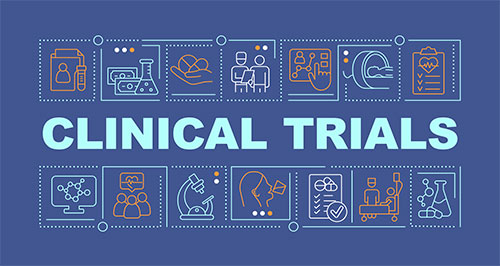Cancer Clinical Trials
What is a Clinical Trial?
A clinical trial is a research study designed to evaluate the safety and effectiveness of new medical treatments or improve existing therapies. These medical treatments may include new drugs, new cancer treatment combinations, new medical equipment, or medical devices, and much more. Participants must be recruited to evaluate these new treatment options.
 Volunteers are typically asked to follow specific instructions and attend periodic visits to track the intervention's effects. Participants may also be asked to keep a journal or answer questionnaires about their experiences
with the treatment.
Volunteers are typically asked to follow specific instructions and attend periodic visits to track the intervention's effects. Participants may also be asked to keep a journal or answer questionnaires about their experiences
with the treatment.
Benefits: Clinical trials can offer several potential benefits for participants, including access to promising new treatments that may not be available outside of the study. In addition, participants have the opportunity to contribute to medical research and help shape the future of cancer medicine.
Risks: Although clinical trials are designed for safety, a potential risk is always involved when participating in a study. For example, some treatments may cause side effects or other complications that may not have otherwise occurred. Participants should discuss any risks associated with a particular trial with their oncologist before deciding whether or not to participate.
Deciding Factors: When considering participation in a clinical trial, it is important for individuals to weigh all of the risks and benefits carefully. Participation is a personal decision, and each person should be guided by their own goals and preferences and any advice from their doctor or healthcare team. It is essential that individuals fully understand what is expected of them before enrolling in a study.
Who Regulates Clinical Trials?
The Institutional Review Board (IRB) is an independent committee that reviews and approves research studies involving human participants. This committee ensures that any research conducted is ethical and follows all applicable regulations, including those of the U.S. Food and Drug Administration (FDA). IRB approval is required before a cancer clinical trial can begin.
Common Misconceptions about Clinical Trials

- "I don't want to be treated like a guinea pig." In reality, most participants report feeling respected and valued. They state they were fully informed of the risks and benefits and had a positive overall experience. Participants also felt they received extra attention from nurses and study coordinators, who were available to answer all their questions and provide assistance when needed.
- "I'll have lots of extra costs that my insurance won't cover." This is not necessarily true. Federal law requires insurance companies to cover routine (standard) costs associated with clinical trials, such as regular blood and radiology tests. However, if the study sponsor requires additional testing, this may not be covered by insurance but is often paid for by the study sponsor. For example, if a pharmaceutical company is concerned about potential changes to liver function caused by a study medication. In that case, they may request extra blood tests or scans in the process of monitoring the drug's safety. The pharmaceutical company or study sponsor would then pay for these extra tests. If there is a potential for out-of-pocket costs, the study nurse/coordinator will review these potential costs with you before you enroll in the trial.
- "I could get a placebo." Placebos are rarely used in cancer clinical trials and only when no other treatment is available. In these cases, the study would compare a new medication to a placebo, and this would be clearly stated in the consent form that you must review and sign before starting a trial. Therefore, you would never be in a study and not know it included a placebo.
- "Clinical trials are only a last-ditch effort." In contrast, clinical trials are often the first step in finding new treatments and cures for cancer patients. Clinical trials can provide access to therapies that are up and coming and unavailable otherwise. Clinical trials can be conducted at any stage of cancer, from early detection to advanced stages.
- "Once I enroll, I am locked into the trial." This is simply not true. When you enroll in a clinical trial, you always control your participation. You can withdraw from the trial anytime for any reason without penalty or repercussion. Clinical trials are designed to be as safe and comfortable as possible for participants, so if you decide that the trial is no longer right for you, you can opt-out.
It's important to remember that when participating in a clinical trial, your safety and well-being come first. You should never feel obligated to stay in a clinical trial if it isn't right for you. If something doesn't feel right or you have any concerns about the trial, it's essential to speak up and ensure your voice is heard.
Source: Oncolink.org
To discover if a clinical trial is available to you, talk with your oncologist or explore one of the links below.

